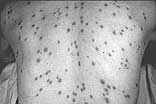|
Syphilis
rises in Tarrant County
By David Reese
News Editor
North
Texas public health officials say the number of syphilis
cases in Tarrant County has increased dramatically while
the number of sexually transmitted disease cases on
the TCU campus has decreased.
According to information provided by the North Texas
Public Health department, there have been 262 reported
cases of syphilis from Jan. 1 to Oct. 15, 2002.
Brian Barron, surveillance disease intervention specialist
with the health department, said the number of cases
is divided almost evenly among males and females.
“There have been 132 females and 130 males reported
this year,” said Barron.
He said the Tarrant County Public Health Department
projects the final number of syphilis cases will be
more than 300 this year.
Marilyn Hallam, assistant to the director of the TCU
Health Center, said 552 STD tests have been given at
the Health Center this year.
She said the individual breakdown of each type of STD
test is not available because the Health Center does
not keep the results.
Barron said the TCU Health Center has not reported any
positive STD tests this year.
He said the university reported three positive STD tests
last year. The types of diseases found in the results
were not available due to confidentiality, Barron said.
Transmission and symptoms
According to the National Center for HIV, STD and TB
Prevention Web site, syphilis is a complex three stage
sexually transmitted disease caused by bacterium. The
disease is referred to as “the great imitator”
because many of the symptoms are similar to those of
other diseases, according to the Web site.
Barron said the disease can be spread like most other
STDs through vaginal, anal and oral sex. He said syphilis
sores can also appear on the lips and in the mouth.
Although the disease can spread through kissing, Barron
said the risk is far less than the other types because
of the less contact time involved.
Syphilis cases are also on the rise in the entire state,
according to information provided by Ed Weckerly of
the Texas Department of Health.
The number of cases have increased in all gender and
ethnicity categories, according to the information.
During January and September of 2001, syphilis cases
were at 379,800 while the same period this year has
441,700 cases or about a 19 percent increase.
Based on information provided by both Barron and Weckerly,
syphilis is most common in African Americans.
Barron said African Americans comprise 53 percent of
the 262 cases this year in Tarrant County while they
are 44 percent of the state’s cases. He said the
next highest ethnic group is Hispanics at 23 percent
and then Caucasians at 22 percent.
Weckerly said the high numbers of syphilis cases among
minorities is hard to target but is largely due to the
crack cocaine epidemic in the mid-1980s and into the
1990s. He said African Americans were the main ethnic
group involved in the epidemic.
He said all public and private physicians by law must
report the number of positive STD tests they administer
to the public health department.
“If they don’t report, it is a Class B misdemeanor,”
he said.
Barron said although it is a crime not to report, it
is very difficult for his agency to find and prove which
physicians do not. He said the TCU Health Center is
very consistent with its reporting.
Barron said most physicians are getting better at reporting
the information which is one of the main reasons there
is an increase of cases.
He said the increase in educational awareness has also
helped.
“Many are beginning to recognize their own symptoms,”
he said.
Education and getting tested
Hallam said the university offers many educational opportunities
for students who wish to know more about most health
issues including STDs.
In addition to packets available in the Health Center,
she said physicians are able to give educational presentations
to any organization on campus including residence halls,
fraternities and sororities. The subject of the presentation
is decided on by the organizers, Hallam said.
Barron said their outreach to the community is lessening
due to the lack and change of personnel. He said the
number of screening efforts have decreased because there
is not enough staff members to cover their areas.
The agency heavily relies on community based organizations
like Planned Parenthood to help in the diagnosis and
treatment of STDs, he said.
Alice Bello, Southeast Planned Parenthood clinic manager,
said her clinic offers many services including STD testing
and treatment.
“We can test and treat gonorrhea and chlamydia,
but syphilis and HIV are done by the county health department,”
she said.
Bello said the clinic is open to all age groups including
those as young as 12 years old who are sexually active.
She said they encourage parent participation from underage
patients but it is not mandatory to receive treatment.
According to the Tarrant County Public Health Department
Web site, Adult Health Services is a division of the
department that performs testing, counseling, diagnosis
and treatment of STDs.
Jane Jensen, HIV/STD program manager, said the testing
is available to everyone and the cost of the treatment
is based on the patient’s income. She said the
minimum is $20 which includes the lab tests, exam and
most medication. Jensen said the cost can be as high
as $160 but that is usually for those who make a significant
amount of money. She said that most students would be
in the minimum cost category.
Hallam said the diagnosis and treatment of STDs for
men and women are available at the TCU Health Center
as well. She said there are more than 5,000 tests that
the Health Center can administer.
David
Reese
|
|

|
|
Special
to the Skiff
|
|
The
lesions on this back are an example of the secondary
stages of syphilis.
|
|